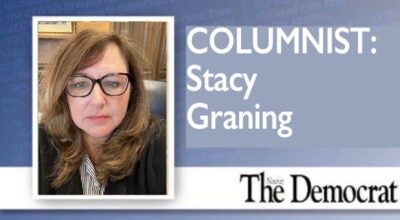Erasing slavery: How narratives of slavery and freedom shape conflicts over the Constitution
Published 10:45 pm Saturday, May 25, 2024
Our Constitution is the ultimate, final, and absolute law of the land. And the federal court system, from the district courts, to the appellate courts, up to the US Supreme Court, is the ultimate, final, and absolute determinate of what the Constitution means and how it is to be properly applied.
Critical concepts of the Constitution are the protections of due process and equal protection under the law. The subject of the Natchez Historical Society’s next monthly meeting is how those keystone features of the rule of law in American life have been interpreted by courts and politicians through the filter of Black enslavement and emancipation. Special attention will be given to the central role of Natchez and episodes from Natchez in that historical process.
The speaker will be one of America’s most accomplished and respected scholar’s of legal history, Dr. Ariela Gross, Distinguished Professor at UCLA School of Law. As a legal historian, her focus over many years, including extensive research in Natchez, has been on the ways race, racism, and slavery have shaped law. Dr. Gross is the author of major books on these subjects published by the Cambridge and Harvard University Presses. Her presentation will be taken from her current book project, based in important part on her research in Natchez’s history, and scheduled to be published in 2026.
Dr. Gross will describe how disputed narratives we tell about slavery and emancipation, for example through monuments, memorials, films, novels, and tourist sites, shape the environment in which Constitutional law is determined. More specifically, Dr. Gross will explain how treating slavery as in our long ago past and portraying Black freedom as a gift from white society, has promoted a nationwide retreat from the Constitutional promises of full citizenship and equality under law. She will describe how over the last several decades increasingly narrow judicial readings of the Constitution’s guarantees of civil liberties have depended precisely on this narrative of the end of slavery and the meaning of the freedom that replaced it.
Dr. Gross’s presentation is sponsored as the annual Grace MacNeil Lecture of the Historical Society. The lecture series, and the presence in Natchez of the distinguished Dr. Gross, is in honor of the late Mrs. MacNeil, who was a Natchez native and resident, and noted philanthropist. Mrs. MacNeil served as national president of the Girl Scouts of the USA and was a major donor of land that is today’s site of the Grand Village of the Natchez Indians.
The meeting will be at the Historic Natchez Foundation, 108 S. Commerce St., in Natchez. The social begins at 5:30 p.m., with the presentation at 6 p.m. There is no charge for admission. All are welcome, members and non-members, alike.
The Historical Society’s programs are partly funded by a generous grant from the Mississippi Humanities Council, through funding from the National Endowment for the Humanities.
ALAN WOLF is a director of the Natchez Historical Society and its program chair.





